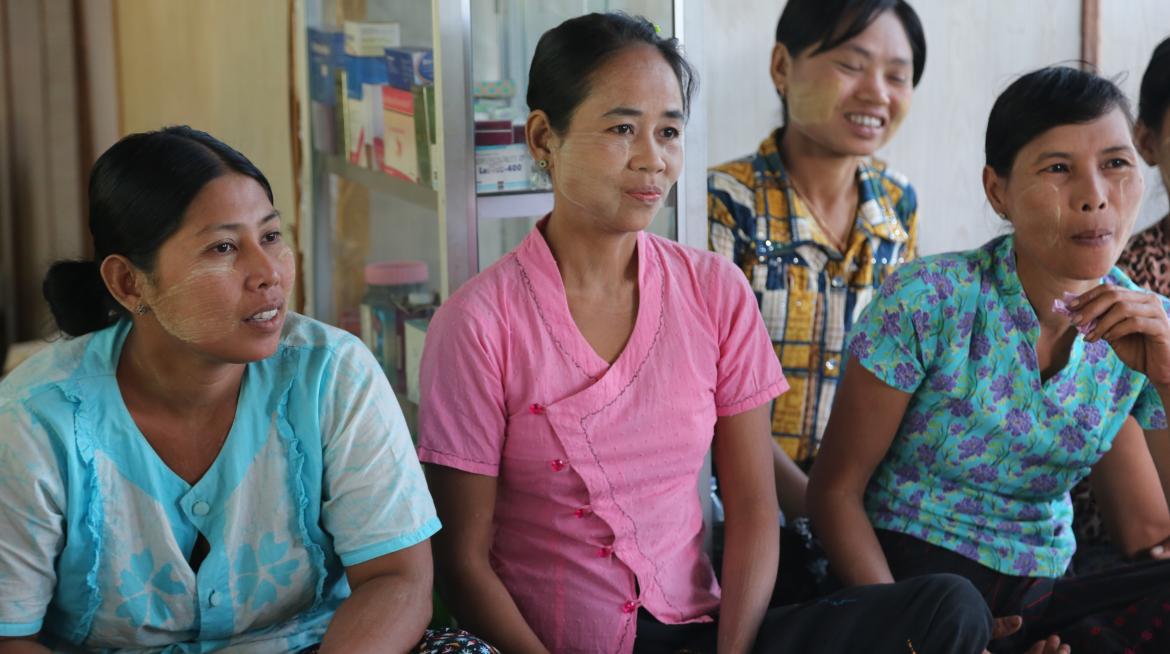
LIFT’s Communications Analyst, Hsu Mon Aung recently visited villages near Bogale to find out how LIFT-funded activities have helped the villagers to manage their own development. She met dynamic ActionAid Fellow Ei Ei Khaing, and members of the community who have tackled their own development issues in Khun Thar Hpyu village. Story by Hsu Mon Aung.
Khun Thar Hpyu village is half an hour’s boat ride from Bogale. First impressions are good: the houses look strong and tidy and the walkway is well maintained. After a few minutes, we come to a small house on wooden piles with a tin roof – the village meeting house and rice storage space - and are greeted by the sound of women’s voices inside, clearly enjoying an animated discussion. As we step inside, we hear more. “Let’s prepare the monthly report after this meeting,” says Daw Moe Moe, the village accountant and member of the village women’s group.
In 2005, UNDP helped the Khun Thar Hpyu villagers to set up Self Help Groups to support village development by way of a revolving fund. When Cyclone Nargis struck in 2008, the entire village lost their homes and farms, and survived amongst the chaos until organisations arrived to provide assistance.
“We decided to establish an informal village committee so that we could manage the assistance well and distribute it equally among the community. But we didn’t know how to organise and manage as well as we do now,” says Daw Moe Moe.
Khun Thar Hpyu is a project village supported by LIFT through the Thadar Consortium, under ActionAid. The project (details here) focuses on building the villager’s capacities to improve livelihoods, and is implemented by the Myanmar Baptist Convention Union (MBCU). The village committee and villagers nominated Ma Ei Ei Khaing, who is interested in village development, to serve as their village ‘fellow’, or community motivator. She underwent training with ActionAid and returned home with her new knowledge. Being a village fellow was not an easy job, she says, but she did her best to share knowledge with the whole community and teach them the importance of inclusive growth.
“The training helped me have a vision. I learned a lot - from basic financial management to leadership. Before the project, we wouldn’t even dare to speak up in front of strangers, so the idea of dealing with government officials and departments was a fairytale, “ she remembers. “Now, all that has changed. When we have an issue - for example, pests on our crops - we go directly to the Myanmar Agriculture Services in Bogale, to get their advice on how we can sort it out.”
As the village fellow, she encouraged the villagers to brainstorm together to come up with a manageable development plan, and they created a “village book” of plans and aspirations. “We provided the training. The villagers had to decide their own development priorities and work out how they would achieve results, who would be responsible for what, and so on. We just facilitated and mentored them.”Daw Kinzana Soe, Chair of MBCU/Metta Aye Yeik, explains how her organisation worked together with the community to help them realise the village book ambitions.
The MBCU project provided the village with start-up capital of MMK 7 million (USD 7,000) for a revolving fund to assist with agriculture inputs, vocational training and livestock breeding. Today, with good management, the sum has grown to MMK 9.2 million.
“In the village book, there were sixteen tasks for us to achieve, and we have completed thirteen so far, “ says Ei Ei Khaing. “The three we have yet to achieve are: to construct rain water collection tank, to get a post-primary school and to get electricity for the whole village.”
The villagers say that life is much better for them now, not only from better farming yields but also with a variety of off-farm activities, such as small-scale soap production and mechanic work, that provide them with additional income.
“The poorer people can make money from these opportunities. They don’t have to worry about affording food. This income also helps them to pay for children’s education, health and social affairs,” says Ma Ei Ei Khaing cheerfully.
The committee also formed a social protection group. “We hadn’t thought of pooling monthly savings before (1,000 MMK each) to help each other. We lend this money without interest for emergency situations – for example, if someone needs to get to hospital to give birth. We can help old people who have no one taking care of them. During the lean season, we lend rice to poor households,” Ma Ei Ei explains.
What is the main change in the village? I ask.
The response is immediate: “Women have got a better position, a vision and we can speak up,” they agree, adding, “But this can get us into trouble!”
I turn to ask the men, who are sitting at the back of the discussion group.
“The women are organised and manage our income efficiently,” the village chairman confirms. “We don’t have to worry about unnecessary expenses and have saved a lot“. The group laughs in delight.
With this sense of inclusiveness, achievement and joy, I believe that development in this village is on a good track.


